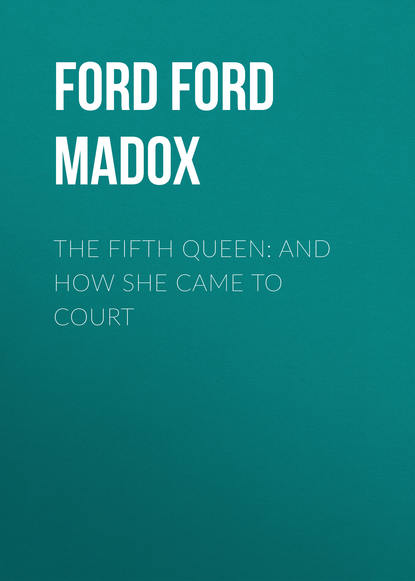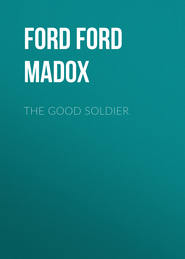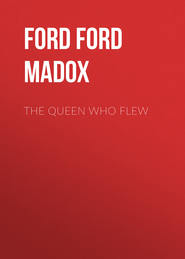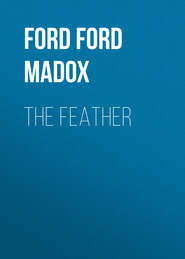По всем вопросам обращайтесь на: info@litportal.ru
(©) 2003-2024.
✖
The Fifth Queen: And How She Came to Court
Настройки чтения
Размер шрифта
Высота строк
Поля
'Nay, I starve not,' the boy said. 'And Margot's a plump faggot.'
'A very Cynthia among willow-trees,' the magister said.
'Why, your magistership shall have her,' the boy said. 'I am her lawful guardian.'
His grandfather laughed as men laugh to see a colt kick up its heels in a meadow.
But the printer waved his bare arm furiously at the magister.
'Get thee gone out of this decent house.' His eyes rolled, and his clenched fist was as large as a ham. 'Here you come not a-wenching.'
'Moody man,' the magister said, 'your brains are addled with suspicions.'
The young man swelled his scarlet breast still more consequentially. 'This is no house of thine, uncle, but my grandfar's.'
'Young ass's colt!' the printer fulminated. 'Would'st have thy sister undone by this Latin mouth-mincer?'
Udal grinned at him, and licked his lips. The printer snarled:
'Know'st thou not, young ass, that this man was thrown out of his mastership at Eton for his foul living?'
Udal was suddenly on his feet with the long pasty-knife held back among the furs of his gown.
'Ignoble …' he began, but he lost his words in his trembling rage. The printer snatched at his long measuring stick.
'Down knife,' he grunted, for his fury, too, made his throat catch.
'Have a care, nunkey,' the young man laughed at the pair of them. 'They teach knife-thrusts in his Italian books.'
'I will have thy printer's licence revoked, ignoble man,' the magister said, grinning hideously. 'Thou, a Lutheran, to turn upon me who was undone by Papist lies! They said I lived foully; they said I stole the silver cellars…'
He turned upon the old man, stretching out the hand that held the knife in a passionate gesture:
'Your Papists said that,' he appealed. 'But not a one of them believed it, though you dub me Lutheran… See you, do I not govern now the chief Papist of you all? Would that be if they believed me filthy in my living. Have I not governed in the house of the Howards, the lord of it being absent? Would that have been if they had believed it of me?.. And then…' He turned again upon the printer. 'For the sake of your men … for the sake of the New Learning, which God prosper, I was cast down.'
The printer grunted surlily:
''Tis known no wench is safe from thy amorousness. How many husbands have broken thy pate?'
The magister threw the knife on to the table and rose, frostily rustling in his gown.
'I shall bring thee down, ignoble man,' he said.
'If thou hast the power to do that,' the old man asked suddenly, 'wherefore canst not get me redress in the matter of my wall?'
The magister answered angrily:
'Privy Seal hath swallowed thy land: he shall not disgorge. But this man he shall swallow. Know you not that you may make a jack swallow, but no man shall make him give back; I, nor thou, nor the devil's self?'
'Oh, a God's name bring not Flail Crummock into this household,' the young man cut in. 'Would you undo us all?'
'Ignoble, ignoble, to twit a man with that Eton villainy,' the magister answered.
'A God's name bring not Privy Seal into the quarrel,' the young man repeated. 'None of us of the Old Faith believe that lie.'
'Keep thy tongue off Cromwell's name, young fool,' his grandfather said. 'We know not what walls have ears.'
The young man went pale: the printer himself went pale, remembering suddenly that the magister was a spy of Cromwell's; all three of them had their eyes upon Udal; only the old man, with his carelessness of his great age, grinned with curiosity as if the matter were a play that did not concern him. The magister was making for the door with the books beneath his arm and a torturing smile round his lips. The boy, with a deep oath, ran out after him, a scarlet flash in the darkening room.
Old Badge pulled at his nose and grinned maliciously at the fire beside him.
'That is thy deliverer: that is thy flail of the monks,' he croaked at his son. The printer gazed moodily at the fire.
'Nay, it is but one of his servants,' he answered mechanically.
'And such servants go up and down this realm of England and ride us with iron bridles.' The old man laughed dryly and bitterly. 'His servant? See how we are held – we dare not shut our doors upon him since he is Cromwell's servant, yet if he come in he shall ruin us, take our money that we dare not refuse, deflower our virgins… What then is left to us between this setter up of walls and his servants?'
The printer, fingering the T-square in his belt, said, slowly, 'I think this man loves too well that books should be printed in the Latin tongue to ruin any printer of them upon a private quarrel. Else I would get me across the seas.'
'He loves any wench much better,' the old man answered maliciously. 'Hearken!'
Through the wall there came a scuffling sound, thumps, and the noise of things falling. The wall there touched on the one that Cromwell had set up, so that there was bare room for a man to creep between.
'Body of God,' the printer said, 'is he eavesdropping now?'
'Nay, this is courtship,' the old man answered. His head leaned forward with a birdlike intentness; he listened with one hand held out as if to still any sound in the room. They heard footsteps from the floor above, a laugh and voices. 'Now Margot talks to him from her window.'
The printer had a motion of convulsed rage:
'I will break that knave's spine across my knee.'
'Nay, let be,' the old man said. 'I command thee, who am thy father, to let the matter be.'
'Would you have him …' the printer began with a snarl.
'I would not have my house burnt down because this Cromwell's spy's body should be found upon our hands… To-morrow the wench shall be sent to her aunt Wardle in Bedfordshire – aye, and she shall be soundly beaten to teach her to love virtue.'
The young man opened the house door and came in, shivering in his scarlet because he had run out without his cloak.
'A pretty medley you have made,' he said to his uncle, 'but I have calmed him. Wherefore should not this magister marry Margot?' He made again for the fire. 'Are we to smell always of ink?' He looked disdainfully at his uncle's proofs, and began to speak with a boy's seriousness and ingenuous confidence. They would tell his uncle at Court that if good print be the body of a book, good learning is even the soul of it. At Court he would learn that it is thought this magister shall rise high. There good learning is much prized. Their Lord the King had been seen to talk and laugh with this magister. 'For our gracious lord loveth good letters. He is in such matters skilled beyond all others in the realm.'
The old man listened to his grandson, smiling maliciously and with pride; the printer shrugged his shoulders bitterly; the muffled sounds and the voices through the house-end continued, and the boy talked on, laying down the law valiantly and with a cheerful voice… He would gain advancement at Court through his sister's marriage with the magister.
Going back to the palace at Greenwich along with the magister, in the barge that was taking the heralds to the King's marriage with Anne of Cleves, the young Poins was importunate with Udal to advance him in his knowledge of the Italian tongue. He thought that in the books of the Sieur Macchiavelli upon armies and the bearing of arms there were unfolded many secret passes with the rapier and the stiletto. But Udal laughed good-humouredly. He had, he said, little skill in the Italian tongue, for it was but a bastard of classical begettings. And for instruction in the books of the Sieur Macchiavelli, let young Poins go to a man who had studied them word by word – to the Lord Privy Seal, Thomas Cromwell.
They both dropped their voices at the name, and, another gentleman of the guard beginning to talk of rich men who had fallen low by the block, the stake, and gaming, Udal mentioned that that day he had seen a strange sight.
'There was in the Northern parts, where I governed in his absence the Lord Edmund Howard's children, a certain Thomas Culpepper. Main rich he was, with many pastures and many thousands of sheep. A cousin of my lady's he was, for ever roaring about the house. A swaggerer he was, that down there went more richly dressed than earls here.'












